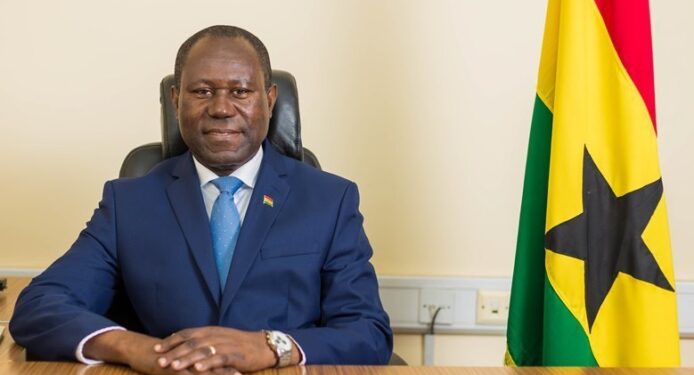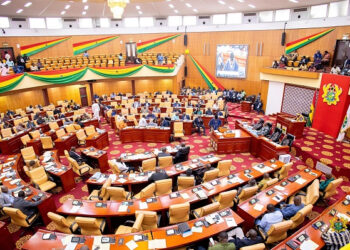Ghanaian cocoa farmers have warned that if cocoa prices remain unchanged, the country may lose more viable cocoa farms to illegal mining.
The request comes in advance of this year’s Cocoa Day (October 1, 2022), which marks the start of the cocoa year.
The day is extremely significant in Ghana since it corresponds with the government’s yearly release of the cocoa producer or farmgate price for the upcoming cocoa season.
A bad signal to cocoa farming
Although the government has yet to make a public remark on the issue, unofficial sources have mentioned Cocobod’s debt as a reason why an increase in the cocoa producer price is unlikely.
Ismail Pomasi, a cocoa farmer in the Ashanti Region’s Ahafo Ano South District, told Cocoa Post that “it will be a bad signal to cocoa farming,” adding that “the industry is already under serious threat.”
The world’s second-largest exporter nation’s cocoa output is under attack from a four-pronged issue of drought, disease, illegal mining, and poor commodity prices, all of which threaten sustainability.
In response to the Cocoa Swollen Shoot Virus Disease (CSSVD), the government and Ghana Cocoa Board (Cocobod), the sector regulator, are executing the National Cocoa Rehabilitation Programme with funding from the Africa Development Bank (AfDB).
A Cocobod audit in 2017 indicated that the disease, which renders cocoa plants unproductive, has infected over 300,000 hectares (300,000ha) of cocoa farms.
Climate change-induced drought, which is also affecting production, has been studied by Cocobod and other stakeholders, and it has been determined that an irrigation intervention might help the situation.
Massive devastation by galamsey
The other two difficulties plaguing the cocoa business, illegal mining and low prices, are enormous puzzles that must be solved.
“When you look at the issue of galamsey and its level of devastation, you’ll realise that if you don’t do something at this time to give some level of assurance and some kind of motivation to farmers, in terms of the pricing, then farmers will be more likely to sell their farmlands to these illegal miners,” Ismail Pomasi opined.
According to him, Cocobod and the government have a good chance to raise producer prices in order to demonstrate their commitment to keeping the cocoa industry as a key contributor to the national economy.
The Cedi depreciation
He noted that the proposal for an increase in the cocoa producer price for the 2022/23 season is not based on irrational assumptions.
Issifu Issaka is the president of the Sefwi Bekwai Cooperative Cocoa Farmers Association and a cocoa farmer in the Western North Region’s Sefwi Bekwai District.
He told Cocoa Post editor Kojo Hayford that his group of farmers is anticipating a 30% increase in farmgate prices for a number of reasons.
“In 2020 when they increased cocoa price to GHS660 the exchange rate was around GHS5.5 [to the US dollar], now the exchange rate is over GHS10. So, the government should consider all these mechanisms [sic] and increase the cocoa price for we [sic] the cocoa farmers,” Issaka argued.
Escalating input cost
Another reason the government must adjust the cocoa price upward, according to his colleague in the Ashanti Region, is the fast growing cost of inputs, primarily fertilizer and insecticides.
“Farmers are incurring costs on labour, input cost and all these things we use our money for have gone up. We don’t even find fertiliser in the market and if you are lucky to even find fertiliser in the market the price increment is about 300 – 400%,” Pomasi emphasised.
He said, “we are aware that at the international level the price has not gone up; we agree with the government, but we are concerned about the dollar and then the effect of the depreciation of the Cedi on the overall economy.”
“So please we are pleading with the government that since the cost of production has gone high over 100%, we know that the government cannot increase the cocoa price by 100% but at least a 30% increment will be ok…so that we all share the losses,” Issaka appealed.
Exchange rate gains
Isamil Pomasi maintained that the government has gained considerable exchange rate gains worth sharing with its hard-pressed cocoa producers since the last hike two years ago.
Read Also: Black Sherif nominated for 2022 BET Hip Hop Awards
“The last time the price was increased, the [US] Dollar was around GHS5 plus, but as I speak now the Dollar has hit GHS10 and beyond and what happens to these gains? ” he inquired.
Cocoa or galamsey dilemma?
Many cocoa producers, they claim, have grown disillusioned due to unsustainable cocoa prices on the global market and the current hard economic situation.
It doesn’t get any better as the prospect of illegal mining grows, forcing many farmers to choose between their cocoa fields and selling out to illegal galamsey miners.
“So, if the government tells us that this year it is not going to increase the price, then the question is are we ready to help farmers sustain the industry? Or we ourselves have also admitted that the cocoa industry has no future, so farmers should start thinking about engaging themselves in other things,” the Ahafo Ano South farmer quizzed.
There have already been reports of numerous cocoa farmers, particularly in the Western, Eastern, and Western North Regions, succumbing to alluring offers from illegal miners.
Fears are that if farmers are not encouraged to persevere, the issue that Cocobod and the government confront may spiral out of control.
“If the government decides not to increase the price, I am telling you we will see so many farmers selling off their farmlands to the illegal miners,” Ismail Pomasi warned.
Exodus underway?
The cocoa farmers told stories of hardship and suffering faced by cocoa farmers and their families, especially children, in cocoa communities.
They stated that any economic circumstance that affects all residents in the nation impacts the cocoa farmer, and that it is rather sad for Civil Servants to receive COLA (cost of living allowance) while cocoa farmers are disregarded.
Cocoa farmers, according to Ismail Pomasi, are aware of the inflows their daily labor generates into the national coffers for the benefit of all Ghanaians.
He cited the USD1.3 billion cocoa syndicated loan that is scheduled to come in for the acquisition of the 2022/23 crop and to aid in the stabilization of the local currency.
“We know that the industry is under threat and we are not coming out with measures to provide some kind of assurance to farmers that you can better your lives with cocoa farming, then I am sorry we will begin to look at other alternatives that could have the potential of not sustaining the industry,” he said.
Issifu Issaka, a Sefwi Bekwai cocoa farmer, echoed this attitude, stating that “so many farmers are running away from the cocoa sector and moving to different areas. People are going into rubber farming, others are going into galamsey activities, and others are going elsewhere.”
On behalf of all cocoa producers, he urged the government to take into account rising input and labor costs, as well as the Cedi’s depreciation, and “raise the cocoa price by a margin of 30%.”
SOURCE: myjoyonline



























